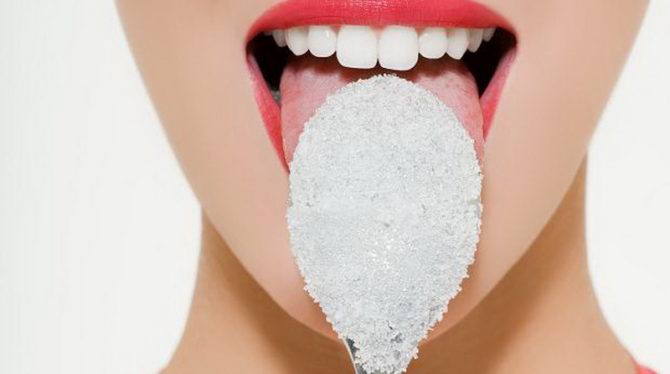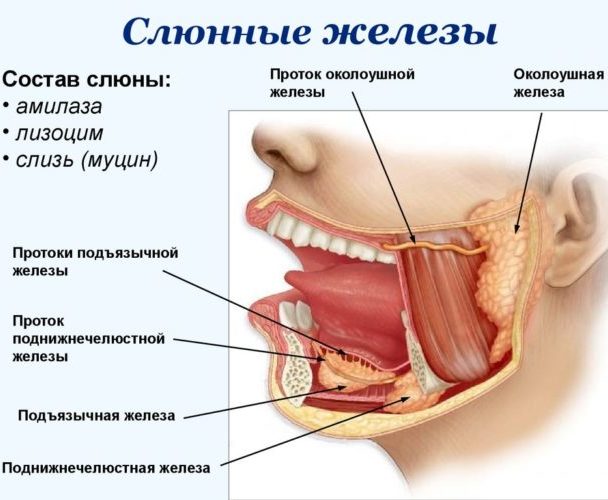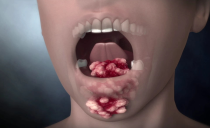The causes of the salty taste in the mouth and methods of dealing with it
The reasons for the unpleasant taste of salt in the mouth are different. Some are easily removable, while others can be the consequences of serious malfunctions in the human body. A constant specific taste in the tongue is one of the first signs of certain diseases, therefore it cannot be ignored. With a prolonged manifestation of the symptom, you must contact a medical institution and find out why a salty aftertaste appears in your mouth.
Content
Complications of ignoring taste
Ignoring the problem leads to the development of various complications:
- There is a loss of appetite. It seems to a person that his favorite dishes have a strange, unusual taste, so he ceases to enjoy eating.
- Against the background of sluggish infections, a decrease in immunity occurs.
- In the case of prolonged treatment to the doctor, the disease goes into a chronic phase.
- Transition of an infection from the oral cavity to vital organs.
- Insomnia, aggression, developing against the background of discomfort, irritation from a constant salty taste.
- Arteriosclerosis resulting from dehydration, a decrease in vascular elasticity.
Diseases caused by salt in the mouth
The most common causes of salt taste in your mouth are:
- Oncological diseases. The reason for the salty taste in the mouth and on the lips is often radiation therapy in tandem with chemicals used in the treatment of tumors.
- Infection penetrated into the nasopharynx. Due to the accumulation of mucus in the nasal sinuses, less saliva is released, as a result, the mucous membrane of the oral cavity constantly dries, and the perception of taste changes.
- Dangerous due to the difficulty of diagnosing salivary stone disease. Stones form in the salivary ducts, giving the saliva a bitter-salty taste and provoking pain during swallowing. With an ailment, the process of salivation is disrupted.
- Pathology of the nervous system. A change in taste in the oral cavity is a sign of a failure in the transmission of signals from nerve endings to the brain. Disorders of brain activity associated with epilepsy, stroke, hypertension, atherosclerosis, ischemia, although rare, are manifested by a changed taste perception, and therefore, an increase in salt balance in the oral cavity.
- An allergy accompanied by persistent coughing and sneezing with the release of salty sputum.
- Inflammation of the glands responsible for the release of saliva: infections of bacterial origin (strepto-pneumo-staphylococcus), sialadenitis, Sjogren's syndrome. Inflammatory processes affect the quality, amount of saliva, constantly secreted by the glands.
- Diseases of the nasopharynx. Sinusitis, which develops as a result of advanced colds, affects the sinus mucosa. Secretory fluid flowing out of the nasal reservoirs flows down the throat wall, which is why an unpleasant brackish taste appears, patients cease to smell. Sinusitis - inflammation of the maxillary sinuses - is accompanied by a salty taste on the tongue and lips for the same reasons.
- Diseases accompanied by a debilitating cough. Sputum, which is separated by coughing, has a salty taste.
- Pancreatitis, a disorder in the functionality of the pancreas, gastrointestinal tract.As a result of malfunctioning of the pancreas, the quantity and composition of the gastric juice changes, which is why salinity appears on the tongue and lips.
Non-Disease Causes
The taste of salt in the mouth may be due to the following factors:
- Dehydration. When using less than two liters of fluid per day, the water-salt balance in the body is disturbed. The composition of saliva changes significantly, which causes dryness, the taste of salt in the mouth (less often there is a sweet or sour taste). Dehydration occurs during vomiting, diarrhea, and the use of extreme methods for losing weight.
- The effects of medications and anesthesia before and after tooth extraction alters the acid environment around the gums, which can cause a salty taste in the mouth.
- Inadequate oral care. The appearance of a tasteless salt sensation is a possible sign of the multiplication of harmful microorganisms. Bacteria affect tooth enamel, contribute to the development of carious disease, the appearance of tartar. By multiplying, bacteria infect the salivary glands, which means they change the taste of saliva from neutral to brackish.
- Salty tears falling into the nasopharynx and leaving a corresponding aftertaste. Abundant lacrimation can be associated both with the emotional state of a person, and with a reaction to dust, bright snow, gusts of wind, the sun or allergies.
Common side effects of certain medications are a salty taste and dry lips. After taking medications with a diuretic effect, dehydration may occur, which also explains the appearance of salted saliva.
Why a taste of salt appears in the mouth of women and men
The reason for the salty taste in the mouth in women is most often pregnancy. The raging restructuring of hormones in the body of the expectant mother causes all possible taste changes. The strange tastes of pregnant women, the desire to eat a salty one is not a ladies whim at all, but a violation of taste perception or dysgeusia. During the bearing of a child, a woman exacerbates the sensitivity of receptors, which makes her food seem fresh. Salty aftertaste in the mouth provokes persistent toxicosis.
In men, a salty taste in the mouth causes such a reason as the intake of a large amount of alcohol. Excessive intake of alcohol-containing agents provokes dehydration, because of which men have an unpleasant salty taste in the oral cavity.
Elimination of salty taste and treatment of the disease that caused it
- The brackish taste caused by the medication disappears after the course of treatment. With severe discomfort should be examined, replace drugs.
 It is easy to remove the sensation of salt caused by poor hygiene with the help of a full brushing of teeth, thorough rinsing of the mouth, additional irrigation of the oral cavity with special means: balms, sprays, solutions.
It is easy to remove the sensation of salt caused by poor hygiene with the help of a full brushing of teeth, thorough rinsing of the mouth, additional irrigation of the oral cavity with special means: balms, sprays, solutions.- Excessive human consumption of alcoholic beverages can cause intoxication of the body, which the pancreas cannot cope with. Eliminate this condition by replenishing the supply of fluid. Water should be drunk either plain or mineral.
If the reason for the sensation of salt on the lips lies in dehydration, then the patient needs to drink more liquid, preferably ordinary drinking water. It should be excluded from the diet drinks that remove fluid from the body - coffee, alcohol.
- If viruses or infections are a possible cause of dryness and salinity in your mouth, seek medical attention. The prescription prescribed by the doctor for the treatment of stomatitis should contain antihistamines and antiviral drugs, immunostimulants, drugs that regenerate tissues. Sinusitis is treated with nasal sprays, anti-inflammatory drugs, analgesics, antibiotics.Therapy aimed at treating inflammatory processes in the salivary glands should include the use of antispasmodics, analgesics, rinses to relieve swelling and inflammation.
- Narrowing and inflammation of the lacrimal canal requires the use of special eye drops, ointments containing antibiotics, hormonal drugs, anti-inflammatory drugs.
- In order for the pancreas to begin to cope with the functions assigned to it, a diet, medication and strict adherence to the doctor's recommendations are necessary.
It is dangerous to self-medicate, all medications (tablets, sprays, ointments) should be taken as directed by a doctor.
Folk remedies for salinity in the mouth
- Chew several roasted coffee beans for 5–10 minutes.
- Rinse your mouth with a decoction of oak bark 5-8 times a day. For its preparation, 3 tablespoons of crushed raw materials and half a liter of water are taken.
- As often as possible, rinse your mouth with warm infusions of herbs: sage, calendula, chamomile. To prepare an infusion of 1 tablespoon of a mixture of herbs, you need to take 250 ml of boiling water.
It is impossible to cure the cause of the appearance of salty taste with folk remedies - the pancreas or gastrointestinal tract after rinsing will not be able to return to normal. However, it is possible to eliminate unpleasant symptoms for a while using alternative methods of therapy.
Prevention of discomfort
In order to prevent the appearance of a taste of salt, you should:
- Visit your dentist at least once every six months.
- Follow drinking regimen to maintain water-salt balance.
- Adhere to a healthy proper diet, give preference to environmentally friendly products.
- Maintain normal stress tolerance.
- Carefully care for your teeth and oral cavity.
- Timely undergo medical examinations to identify diseases that provoke the appearance of a brackish taste in the mouth.






